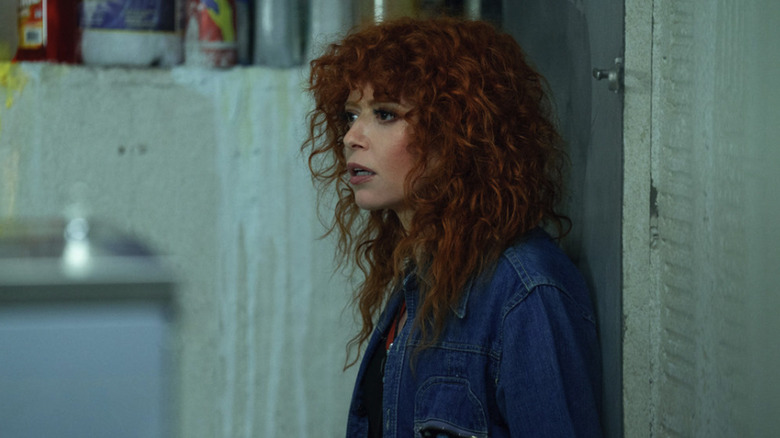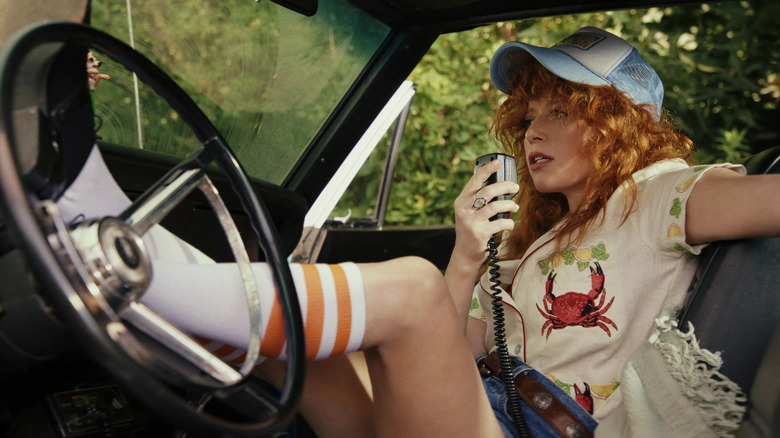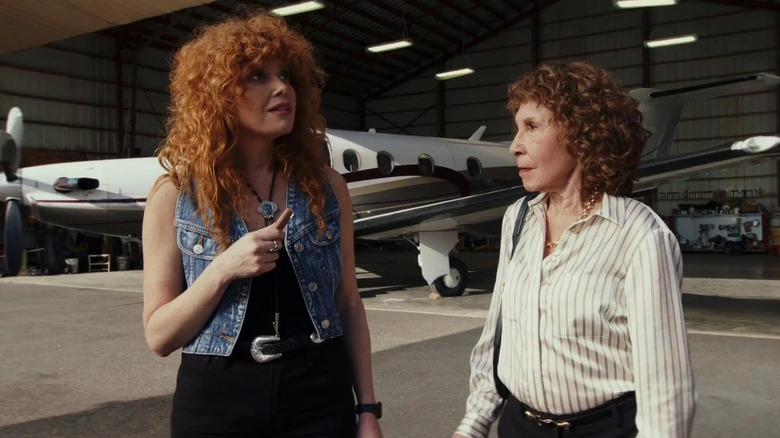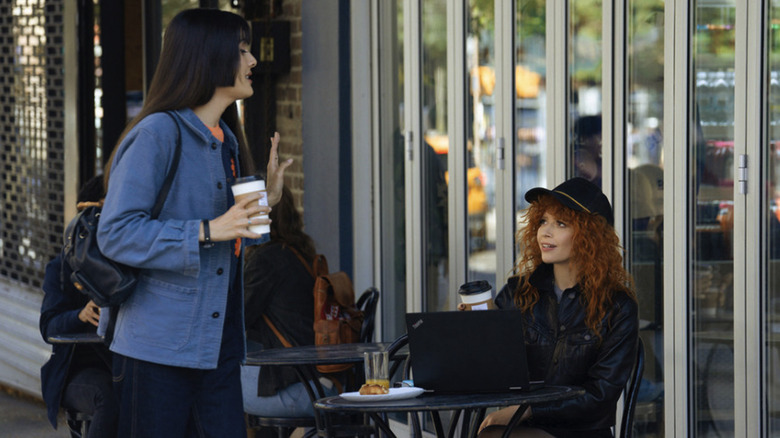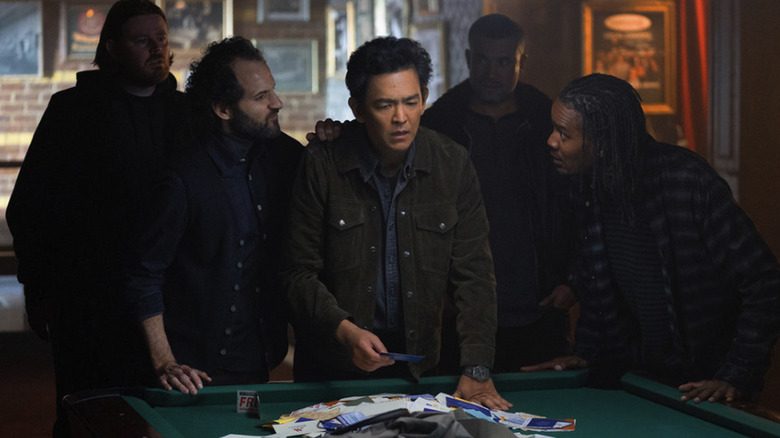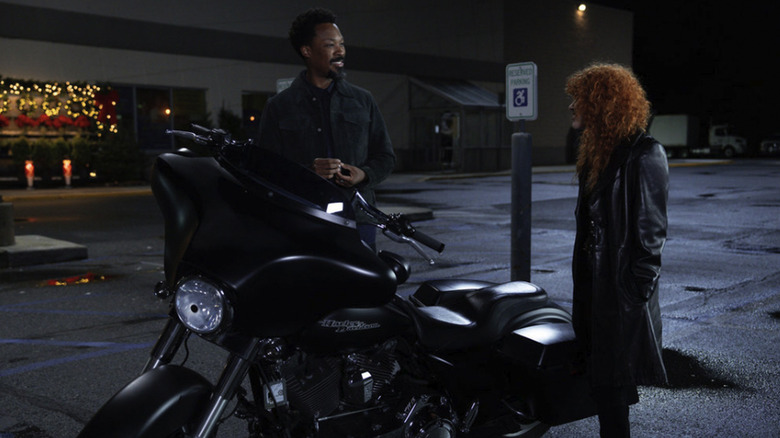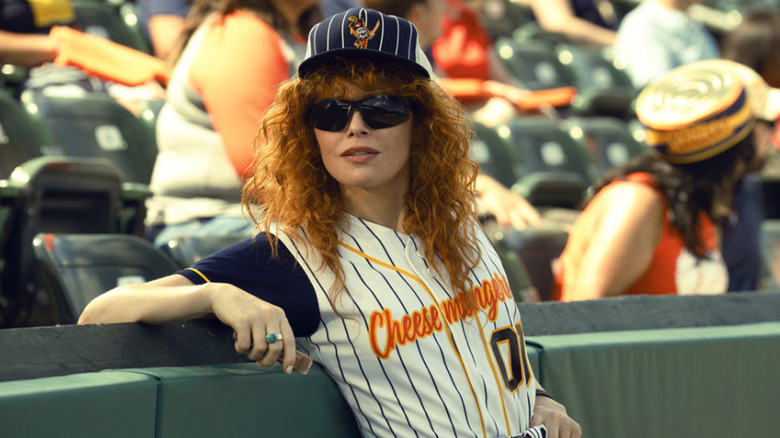Poker Face Showrunner Shares The Wacky Episode Idea Too 'Cartoony' For The Show [Exclusive Interview]
This article contains spoilers for season 2 of "Poker Face."
After a somewhat hit-or-miss first season, "Poker Face" made a surprising choice in season 2.
Instead of doubling down on the serialized elements it established in season 1, the series largely wrapped up that storyline quickly and promptly kicked it to the curb, giving Natasha Lyonne's Charlie Cale character the freedom to wander across the country without having to constantly look over her shoulder. The result? The show feels like it came into its own, unburdened by the narrative restrictions of Charlie caught in a web of rival gang families and finally able to focus on the purest version of the how-catch-em formula as she bounces from city to city. Unfortunately, I thought everything kinda falls off a cliff in the last two episodes and seems to set up a third season that feels like it might undo all of that and return to Charlie looking over her shoulder once again, but that's a conversation for another time. (We'll almost certainly talk about it on the next episode of the /Film Weekly podcast, so subscribe if you haven't!)
I wasn't the only one caught off guard by the choice to (mostly) leave the serialized aspect in the rearview mirror. "Yeah, I was surprised by it too, but I'm really glad we did it," season 2 showrunner Tony Tost told me in a recent interview. Tost, who was not part of the show during season 1, met with "Poker Face" creator Rian Johnson before the season 2 writers' room convened and received some guidance that helped shape the season as a whole. "Part of our mandate from Rian is don't repeat stuff from season 1. Like, 'We did season 1. Don't fall into expectations,'" Tost explained. That led to some fun experimentation, but for a formulaic show (complimentary) to avoid repeating itself is a tall order. Here's how they pulled it off.
(Note: This interview has been lightly edited for clarity and brevity.)
Why Poker Face season 2 largely scrapped its serialized structure
Tony, as the showrunner of season 2, you oversaw the writers' room. But different showrunners have different approaches or availabilities when it comes to being on set. Were you also on set every day during production?
Tony Tost: I wasn't on set. I was in New York. We filmed in New York. I went out there for prep, all the way through the last day of filming. But in terms of being on set, I would rotate with other writers on set. We had also Laura Deeley, Wyatt Cain, and Raphie Cantor at different points as the other writers on set, and so we'd kind of rotate. Because I'm kind of concurrently on set prepping the next episodes and also working on post on episodes and then also fine-tuning scripts along with Rian [Johnson], and so you're kind of in four places at once type thing. So I'm not always on set, but I was always there.
Gotcha. So, I was fascinated by the decision to largely ditch the serial throughline of the show after only a few episodes this season and have Charlie basically wandering the country without having to look over her shoulder. How did that decision come about?
Yeah, I was surprised by it too, but I'm really glad we did it. I think the short version of it is Rian was like, "Hey Tony, I don't think I want us to do Beatrix Hasp chasing [Charlie] all season. We did that in season 1. Let's do something else. Let's wrap this up early and see what else we can do." To me, that opened us up to kind of have a little bit more breathing room. You're losing some of the pressure of that and some of the serialized element, but then hopefully what you gain by it is a little bit more room and a little bit of the "case of the week"-ness, which I think is really the heart of the show. So yeah, it was definitely something I co-signed once Rian brought it. But like most things with the show, it starts with Rian and his vision and then we try to execute the best version of it we can.
Poker Face season 2 seemingly resolves one plotline, but brings it back at the end
I really appreciated that decision. Tell me about bringing that Beatrix Hasp storyline back for the final two episodes.
Yeah. Well, we knew that we weren't going to have Hasp and her goons chasing after Charlie, but we did want it to wrap up some way. So really, the Alex story, the Patti Harrison story, that to us was like, "Okay, that's the season 2 [big idea]," even though it's introduced later. It started with that. With, like, "Okay, we want to introduce this character." We knew from early on once Laura Deeley, one of our writers, came up with the idea of this character. So it just seemed a natural way of like, "Well, why would this Alex character, this great assassin, the Iguana, target Charlie?" "Well, to get Hasp." So then there was a way of, okay, we seem to resolve Hasp early, and we do, but then we kind have that in the back pocket to come back in later.
And structurally, it was almost like a [have your cake and eat it too scenario]. Then we could have this middle portion where Charlie's on the road, kind of this existential road trip, she's trying to settle down, and then this element that we thought we put to bed early into the season arises in a different form than maybe people are anticipating.
Absolutely. So when was the decision made to increase the episode count this season, to go from 10 to 12?
Before I came on.
Okay. So was that something that you were excited about, or nervous about, or ... how did feel about that?
Scared. Yeah. It's, weirdly, it's a significantly different — like, the previous show I was on, "Longmire," we always did 10 episode seasons, but one season we did 13 and it almost broke the show. I don't know how network shows do those 20-plus orders. They're superheroes to me, to be able to pull that off. So I mean, the challenge on this show, it maybe would be less daunting, but every single episode is its own pilot, its own mini-movie. We literally, until the very, very end and the Good Buddy apartment, any set we build, we tear it down after 10 days. We lose all the cast and we have to recast the whole show. That means we have to get costumes for every new character, new props, new locations, new everything. So, it's two more spins on that very daunting hamster wheel.
Is it a really expensive show because of all those things that you just mentioned? It seems like it would be from the outside.
It's not as expensive, I don't think, as an HBO show. We stick to a 10 day schedule. But I would say we're ... I mean, it's a larger budget than any show I've been on, but I haven't been on big budget stuff. So I think we're probably kind of somewhere in the middle.
The Poker Face writers don't want to repeat themselves
Did you always know that the finale was going to be split into two episodes? We were talking about that Alex storyline. When that got introduced, did you guys say, "Okay, we have these two extra episodes this season. Let's slot that in here and just split this story in two?"
So in terms of figuring out season 2, after I got the job, Rian and I were in the writers' room, just the two of us before the writers came in. And I started putting note cards on the board, like 201, 202, just to kind of conceptualize what we might want the season 2 story to be. And Rian was actually, politely, but [he was] like, "Tony, actually, I don't want you to do that. I want you to take the cards down. I want the writers to come in and just focus on breaking one good mystery that could fall anywhere in the season. We'll do that a couple times, internalize that."
Actually, the Gator Joe episode, the fourth episode, is the first one we broke. The second one we broke was the baseball episode. So we kind of did that and then we kind of took a breath and it's like, "Okay, we've got some standalone episodes. Now let's talk about the overarching storyline." And Laura had talked about this Alex character, and so then, yeah, pretty early, there was Alex part one, Alex part two on the board before we even got to breaking those. So then it started kind of taking shape maybe around the midpoint of the writers' room.
When you're breaking an episode with the writers, is there always a conversation about how far to push Charlie's detective abilities? Does anybody in the room ever push back when they first hear how she's going to learn the most crucial piece of information about a crime or anything?
I don't know if they push back. Well, there's a certain template to every episode that we want. So we want to provide that template because there's a certain comfort food element of the show, but we always want a new variation on it. We don't want to just repeat ourselves.
Sometimes there's an exploration. Sometimes it's like, "Okay, how do we use Charlie's bulls*** detector in a little different way, where for some reason it doesn't quite work or doesn't work like she thinks it does or we didn't end up using it?" We talked about in one episode of her seeing somebody she trusts through a window. She doesn't hear what they're saying, but she can tell that they're lying and that gets her intrigued. We didn't end up going with it, but it's more discussions of just, "Okay, we have this constant from episode to episode, this bulls*** detector. How are we going to approach it this episode?" So it's kind of brainstorming around that front.
We usually start with a subculture or a world to be in, and we usually start with the murder itself and the murderers and the story of that first act before Charlie comes in. That's usually our starting point. And so once we're enmeshed in the problem-solving of that, then we'll naturally come to start talking about Charlie's bulls*** detector and how we want to approach it this episode.
One Poker Face season 2 episode was written, but ultimately never made
I was actually going to ask you if there were any ideas that you pursued, either as episodes or within episodes but ended up abandoning, and that window one sounds like that was on the table at one point. Is there anything else that you can think of that you guys ended up putting to the side?
There's one episode we were going to do. We actually had a script and we ended up not doing it partially because, just production-wise, we couldn't pull it off. But it was going to be set — basically some tech bros taking over a monastery and accidentally reinventing religion, which I thought was pretty funny. [laughs] And Charlie teams up with a crow to solve it. Maybe that was getting a little cartoony, but I liked it.
A literal crow, an actual bird?
An actual crow. Crows are pretty smart. There's a weird animal throughline on this season. We were tickled by it. But ultimately, we ended up pulling that and then — and nothing against that episode — but then "The Sleazy Georgian" with John Cho and Melanie Lynskey took the place, and that's one of my very favorite episodes of the whole season. So it ended up being the right call. So yeah, who knows? But there is at least one completed season 2 script that just we ended up pulling from the schedule.
Charlie gets a real romance in season 2 (though it ends tragically)
In terms of the serialized elements of the story, how did you think about Charlie and Bill's relationship and the emotional fallout that she would be experiencing in the wake of his murder in episode 7? I know it wouldn't be fun for viewers to watch Charlie be heartbroken about that for several episodes in a row, but it seemed like their connection was so strong that it could have warranted that level of reaction. Did you guys have a conversation about that?
We knew we wanted Charlie to have a real romance because we hadn't seen that yet in season 1. She hooks up in season 1, but it's less [serious]. And so we wanted to explore that, and because of the nature of the show, he ends up getting killed.
What we do a lot on the show is we almost — and this is particularly for Charlie — we almost sketch a dance floor and then Natasha comes in and she knows the character and she's such a strong voice on the show, we kind of almost create space for her to come in and emphasize to the degree that Natasha feels warrants for the character to how much to lean into it. And so we don't over-determine it. We don't override it. Like in "The Sleazy Georgian," she has a line when she's talking to Manny, where she's just like, "Oh, it's great for you. You got married," and Manny's like, "Yeah, I never thought it'd happen to me." And she's like, "I thought I had someone," or "I had someone." That was all ad-libbed between the two actors. So that wasn't in the script. That was just Natasha pushing the scene to go a little bit further past the written point and having a good scene partner in Joel Garland. They'd worked together on "Orange is The New Black." And I think that was something that she wanted to explore in the character. We try to have a little bit of a light touch on some of the emotional elements, in a way. It's not a trauma-fest, maybe, type of show. Yeah, it's a complicated answer. We kind of try to get halfway there in the writing, and then Natasha then pushes it as much as she's feeling it.
Yeah. Corey Hawkins was so good in that episode. Do you remember any big scenarios this season where you were banging your head against a wall trying to figure out a solution to a problem and then finally cracked it?
Yeah, every episode. Every episode. It's really tricky. It's really, really tricky to — usually, when we're breaking an episode, act one goes pretty well. We're all pretty excited. New characters, we're introducing a new world, there's a murder. We're doing all that. Act two? Usually pretty fun. Like, "What's Charlie doing there? Oh, wouldn't it be fun if she's here or if she's there?" and we catch up and we write a scene with her, usually with the participants in act one. And then act three hits, where we have to get Charlie invested and get her on the path of solving it. And we inevitably are almost literally hitting our heads against the wall, because part of our mandate from Rian is don't repeat stuff from season 1. Like, "We did season 1. Don't fall into expectations." So we come up with solutions. Rian comes in multiple times each week, not just to give a thumbs up or thumbs down, but to reach in, tweak, change what we're breaking. So we're always kind of writing towards his enthusiasm. So finding new ways of, without repeating what we did in season 1, it's tricky.
And then it's also tricky — you'll think you have it in script form, and then you get to production and you realize, "Oh, to make it the 10 days, we actually have to cut six pages from the script." And lots of times, it's that detective thing that you'd broken, so you end up kind of fusing scenes together or beats together, and you're just crossing your fingers that if you're watching the show for the how-catch-em element, there's enough there to keep you interested. So it's a tricky thing because it's both a mystery show and it's a comedy show, and you need to give a s*** about the characters. And to serve all of that in an episode, sometimes an episode's 41 minutes, sometimes it's 50 minutes-plus, and it's supposed to be challenging, right? But it is definitely challenging.
A surprising amount of Poker Face is 'found in the edit'
What's something that diehard fans of the show might be surprised to learn regarding how it's made?
I think people would be — how much of the look is due ... Rian and Natasha are the faces of the show for a reason. Someone like me, a showrunner, sometimes it's an elevated position and talking as the authority of it. I am really proud of the show for many ways, but I just love looking at the show. It's a fun show to look at. And that is Judy Rhee, our production designer and her whole department, art department, and our two cinematographers, Christine Ng and Jaron Presant, and then Tari Segal did one. They really are the unsung heroes of that element of it. That's a big part of it that maybe doesn't get [shouted out]. And then Leah Katznelson, the costuming. Obviously Natasha weighs in a lot on Charlie's look, but the whole look of the show is also like [Leah's] department. I guess that's with every show, but I think we have some real A-level heavy hitters on that front. So that's a big part of it.
Also, just how much of it gets found in the edit. It's really interesting to see the episodes take shape. I think this season, moreso than season 1 — I don't know, I wasn't involved [during season 1] — but there was a little bit more looseness on set, and so how much of these little nuggets were actually little ad-lib moments, largely with Natasha and often friends of hers or past people she worked with. Lots of the people's little favorite elements of the show, how that comes in. And also just how many hands are involved on the creation of these scripts. It's the whole room coming up with the stories together. Then the individual writer goes off and then brings an outline to Rian and myself, Rian and I talk about notes, give notes. Eventually, the script phase, I'll do a revising pass. Then Rian will do a final pass on the scripts.
But then sometimes we'll cast somebody else, some heavy comedy hitter, and we'll realize they don't have enough funny things. And so I'll send the script, especially to Wyatt Cain, one of our writers. It's like, "Wyatt, will you do a punch up script for this character?" And some of the best gags will come from that. So there's many hands in this to make these even just little throwaway one-liner things, it has to go through this process. It's not just one writer goes off and does one thing, or it's just Rian off doing one thing. It's this group effort that hopefully is just really easy to watch and enjoyable, but takes many, many stages of evolution to get there.
The first two seasons of "Poker Face" are streaming on Peacock.
